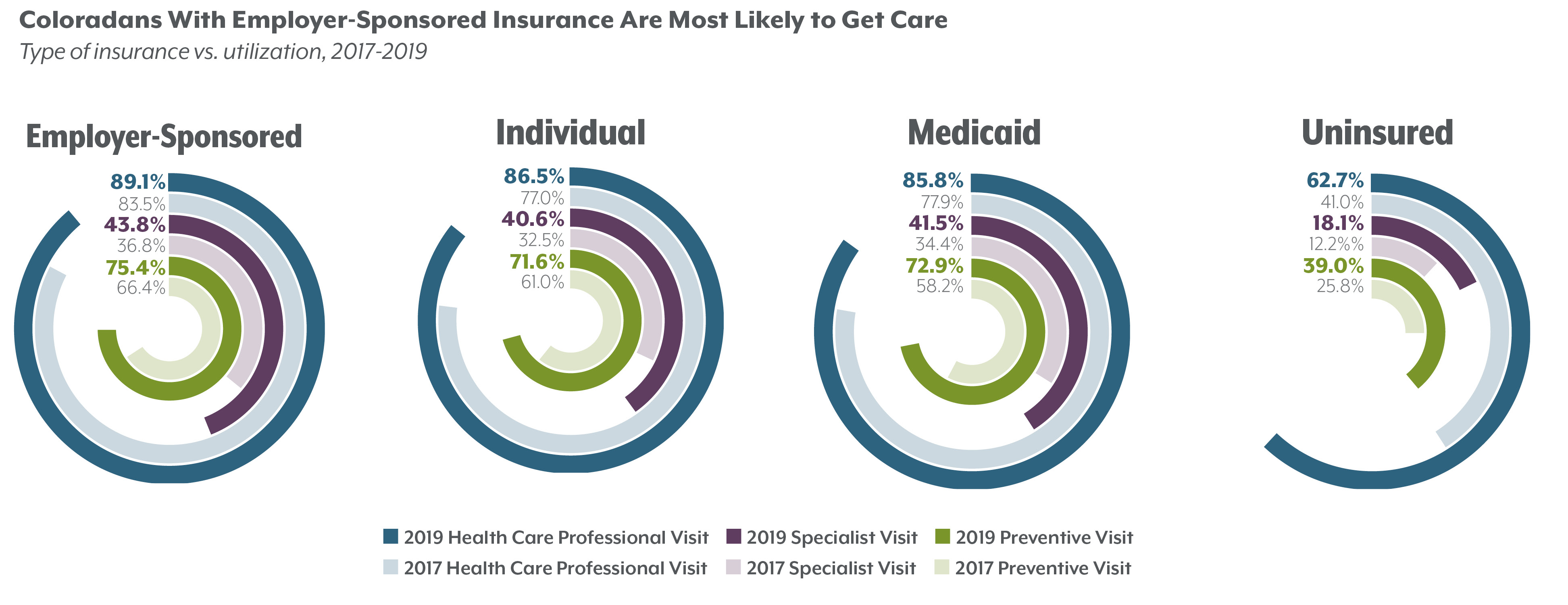
2019 Colorado Health Access Survey: Access to Care
Use of Health Care
Coloradans are getting their annual checkups. More residents than ever report having a usual source of care (87.6 percent), and nearly three in four (74.0 percent) got preventive care in the past year, an increase from 62.4 percent in 2017. Increased use of preventive care is often thought to decrease emergency room visits, but the CHAS finds that the rate of emergency care use remained steady even as use of preventive care became more common.
About one in five Coloradans (20.8 percent) visited an emergency room in the past year, and of those, more than a third (38.0 percent) say they went for a condition they felt could have been treated by a regular doctor.
Persistent barriers to care that lead people to the emergency room for nonemergency reasons include needing care after hours and difficulty getting an appointment with a different health care provider soon enough. Expanding primary care capacity and availability may help alleviate unnecessary strain on expensive and limited emergency resources.
Insight
Policy: House Bill 19-1233 seeks to create a more comprehensive primary care system by increasing investments in primary care through payment reform and expanded benefit packages. The hope is that this will increase care quality while reducing overall costs incurred in high-cost settings like emergency rooms.
Views on the Health Care System
Nearly three in four Coloradans (73.8 percent) are happy with the state’s health care system, saying it meets the needs of their families. This has remained relatively consistent since the implementation of major ACA reforms in 2014, and it represents an increase from a pre-ACA approval rating of 69.1 percent.
But different groups report different experiences with the system. Among Coloradans with individual insurance, only about half (54.5 percent) say the system works for them and their families.
And among those with no coverage at all, approval is at just 27.5 percent.
As Colorado and the nation continue to debate major changes to the health care system that would affect coverage and, potentially, the role of government and insurers, people’s perceptions of the health care system can offer insight into their experiences with past policy changes.
Insight
Policy: For some Coloradans, politics continue to impact coverage. In 2019, 6.3 percent of uninsured Coloradans say they don’t have coverage because they disagree with Obamacare (the ACA).
Data: Just two-thirds (66.2 percent) of rural Coloradans believe the health care system meets the needs of their families, compared with three-quarters (75.2 percent) of urban residents. Rural residents often find themselves facing higher insurance premiums and a limited choice of providers.
Explore The 2019 CHAS
2019 Colorado Health Access Survey: Health Insurance Coverage
A record number of Coloradans have health insurance, and growing numbers are having trouble paying their medical bills.
2019 Colorado Health Access Survey: Behavioral Health
In 2019, 15.3 percent of Coloradans reported poor mental health, compared with 11.8 percent in 2017. The increase could signal worsening mental health — and an increased willingness to talk about it.
2019 Colorado Health Access Survey: Social Factors
Nutritious food and housing are fundamental to health. Yet one in 10 Coloradans don’t get enough to eat, and one in 15 worry about having a place to live.
Barriers to Care
Most Coloradans have health insurance, but barriers to accessing health care persist and, in some cases, are more prevalent than before. More than one in five Coloradans (22.0 percent) did not see a doctor in the past year because they could not get an appointment as soon as they needed, an increase from 15.7 percent in 2017.
And more than one in 10 Coloradans (10.8 percent) couldn’t find a provider to take their insurance.
Historically, Medicaid members have been more likely to report that they struggle to find providers who accept their insurance, but in 2019 individually insured Coloradans were nearly as likely to report this barrier. One contributing factor could be insurers narrowing their networks of contracted health care providers to control costs.
Insight
Data: Women face a variety of barriers to getting care at higher rates than men. For example, while 18.2 percent of men say they were unable to get a timely appointment in 2019, 25.8 percent of women report this issue. This may be in part because women tend to have more appointments than men, which increases the likelihood of running into one of these issues.
The CHAS is fielded, analyzed and managed by the Colorado Health Institute.
CHI contracts with SSRS to conduct the survey.
The survey is primarily funded by The Colorado Trust and The Colorado Health Foundation.



